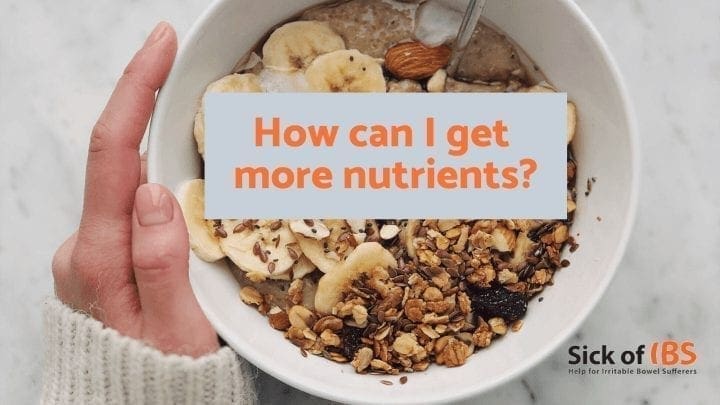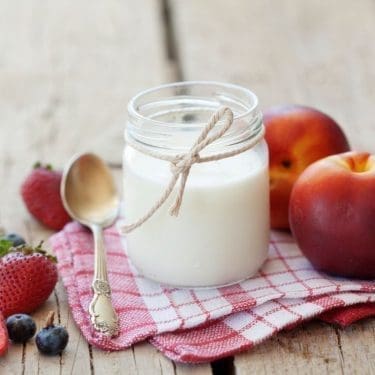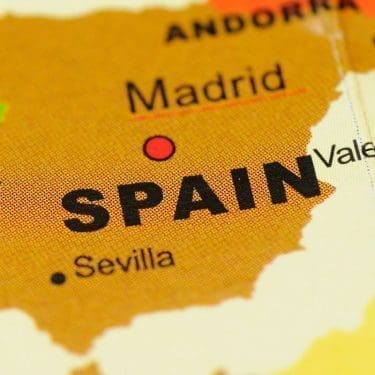
Do you have trouble eating with IBS and are worried that you might not be getting the nutrients you need to support your health? When you are limited with what you can eat (which, let’s face it, most of us with IBS are), it’s normal to be concerned about how you can get more vitamins and minerals in an attempt to stay healthy.
After all, we have all been taught how important a healthy diet is. How we need our vitamins and minerals for our body to function well, and that to get them we need to eat a wide range of foods.
When you can consume only a limited number of foods, how can you get more nutrients and stay healthy with IBS?
Vitamin pills may be an option. If you can digest them.
But what other options are there?
How will my limited diet impact my future health?
As I had troule eating with IBS, this was a burning question for me. I had fructose and lactose intolerance for as long as I could remember. So I wasn’t getting any of that healthy milk and fruit for most of my life.
Then as my IBS got worse I found my diet becoming more and more limited. And I was worried about not getting enough nutrients to stay healthy.
[To tell you a secret, I was convinced deep down I would die quite young.]
My personal findings

I have now fully recovered from IBS – but I wondered if there would be consequences.
Consequences of missing out on a wide range of foods, and a wide range of nutrients over a very long period of time.
I did lose a tooth with each pregnancy. And this prompted me to start drinking use mineral water rich in calcium and magnesium to supplement my needs.
I also made sure to get outside and walk often and boost vitamin D levels.
However, to my great surprise I haven’t had any other obvious consequences. My body seems to appreciate the wide range of food I can now eat and digest perfectly. Even milk and fruit.
And it has bounced back surprisingly quickly with no known after-effects or deficiencies.
How can I get more nutrients with IBS
If you want to get more vitamins and minerals into your body and want to stay healthy with IBS, I would suggest the following:
- no “forcing” so-called “healthy” foods on your delicate digestive system. (You can’t absorb many nutrients from foods that inflame your digestive tract.)
- cooking simple, quality ingredients that you digest the best from scratch
- getting exercise outdoors if you can to boost vitamin D levels (reported to be low in many IBS sufferers)
- supplementing where possible depending on which foods you cannot digest (or compensating with different foods if this is an option)
- not getting over anxious about this (worrying won’t actually help). Your body is probably much better than you thought at balancing all this
If you need help or are anxious, contact an IBS-specialised dietitian. Someone that will understand that what you can’t digest, you just can’t digest. And will not be forcing “healthy”foods on you.
A very curious story

To finish with I’d like to share a very curious story with you that goes against mainstream thinking.
My daughter went on exchange to Seville, Spain.
When the class came back they were all craving fruit and veg (very strange for teens!)
They said that the families in Seville didn’t eat much in the way of fruit and veg at all. And they hadn’t had any while they were away.
And this was actually confirmed when the teenagers from Seville came to stay with us.
Even the adults accompanying them didn’t have anywhere near 5 fruit and veg – per week!
Yet the population in Seville is still stays healthy and thriving – without all the usual vitamins and minerals we are told we need…
What if the body is in fact very capable of adapting to the nutrients it receives? Much more than we might think anyway.
Maybe we have been taught to make more of this than is actually necessary… and you will be OK.
If you found this article helpful, inspiring or supportive, please give it some love back, and click on the heart.
14